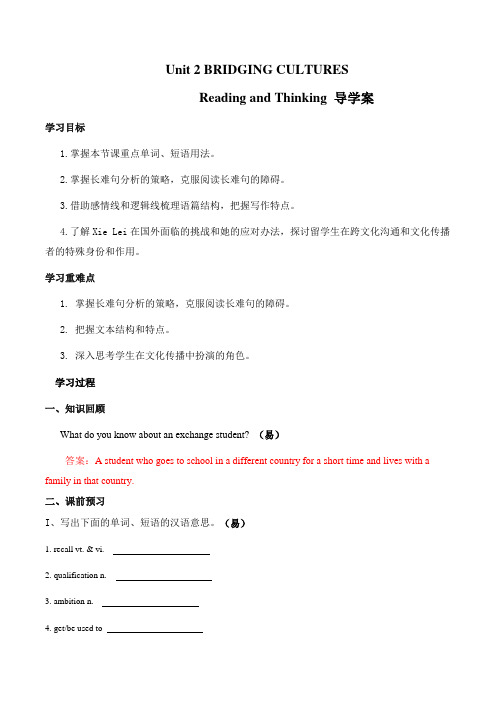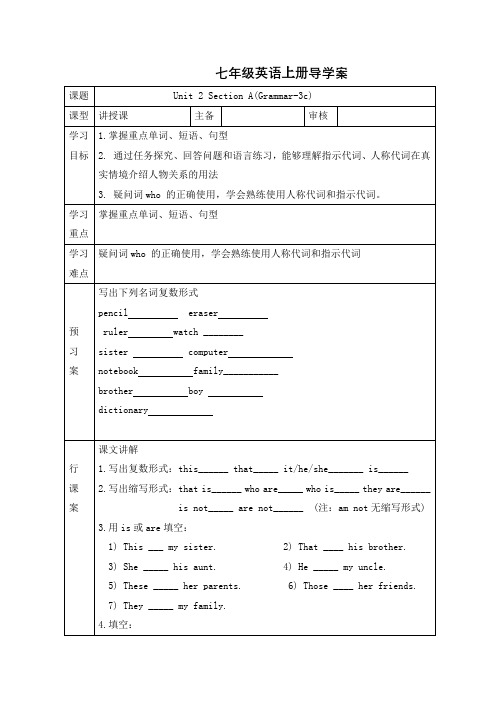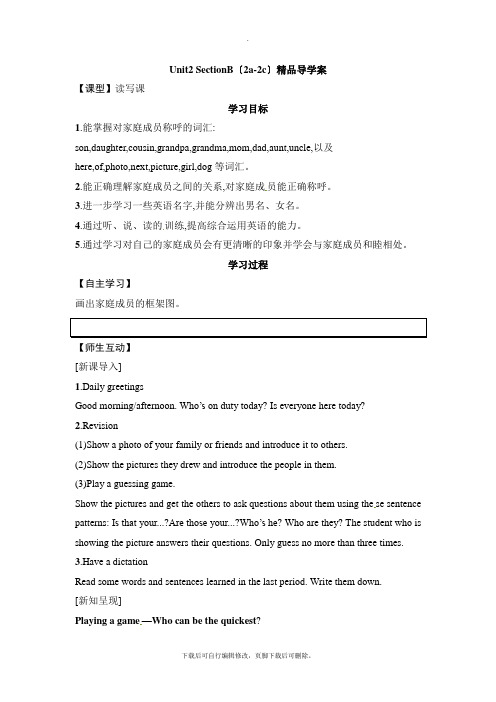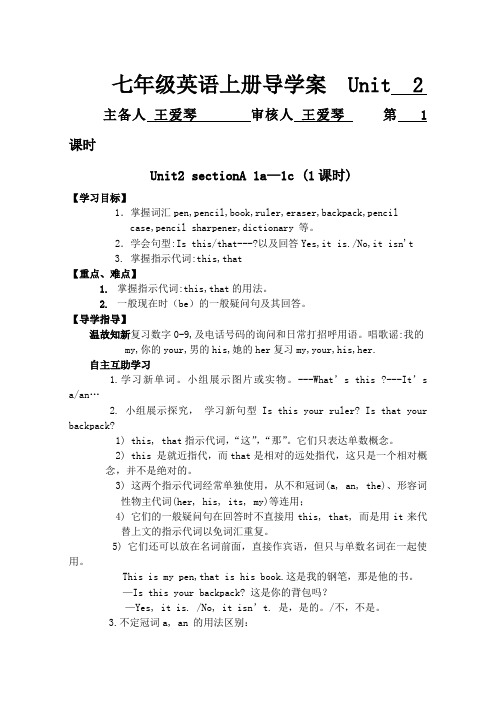unit 2导学案
Unit2BRIDGINGCULTURESReadingandThinking(导学案)

Unit 2 BRIDGING CULTURESReading and Thinking 导学案学习目标1.掌握本节课重点单词、短语用法。
2.掌握长难句分析的策略,克服阅读长难句的障碍。
3.借助感情线和逻辑线梳理语篇结构,把握写作特点。
4.了解Xie Lei在国外面临的挑战和她的应对办法,探讨留学生在跨文化沟通和文化传播者的特殊身份和作用。
学习重难点1. 掌握长难句分析的策略,克服阅读长难句的障碍。
2. 把握文本结构和特点。
3. 深入思考学生在文化传播中扮演的角色。
学习过程一、知识回顾What do you know about an exchange student? (易)答案:A student who goes to school in a different country for a short time and lives with a family in that country.二、课前预习I、写出下面的单词、短语的汉语意思。
(易)1. recall vt. & vi.2. qualification n.3. ambition n.4. get/be used to5. adaptation n.6. fort vt. &n.①vt.②n.7. take turns to do sth.8. participation n.答案:1.记起;回想起;使想起;召回2. (通过考试或学习课程取得的)资格;学历3. 追求的目标;夙愿;野心;抱负4. 习惯于做某事5. 适应;改编本6. ①安慰;抚慰②安慰;令人感到安慰的人或事物;舒服;安逸7. 轮流做某事8. 参加;参与II、自主预习与检测。
(易)1. qualification词性:____________ 意思:_____________acquire/gain/get/obtain/have/hold qualifications获得/取得/得到/拿到/拥有/持有资格a qualification for对……的条件qualify vt.& vi.(使)具备资格;(使)合格qualify for有资格……be qualified for胜任……,适合……练习:He's been informed that he doesn't qualify _________ the scholarship because of his academic background.他被告知,因为其学术背景,他没有资格获得这笔奖金。
Unit 2 Section A 导学案 人教版七年级英语上册

6.Those ________ their apples. Where ________ his apples?
七年级英语上册导学案
课题
Unit2 Section A(Grammar-3c)
课型
讲授课
主备
审核
学习
目标
1.掌握重点单词、短语、句型
2.通过任务探究、回答问题和语言练习,能够理解指示代词、人称代词在真实情境介绍人物关系的用法
3.疑问词who 的正确使用,学会熟练使用人称代词和指示代词。
学习
重点
掌握重点单词、短语、句型
Yes, ____ ____. No, ____ ______.
5. He’smy father.(对划线部分提问)
______ he?
6. They’remy grandparents.(对划线部分提问)
_______ they?
二、用am,is,are填空
1.Excuse me! ________ this your eraser?
学习
难点
疑问词who 的正确使用,学会熟练使用人称代词和指示代词
预
习
案
写出下列名词复数形式
pencileraser
rulerwatch ________
sistercomputer
notebookfamily___________
brotherboy
dictionary
行
课
案
课文讲解
1.写出复数形式:this______that_____it/he/she_______ is______
8)他是我的弟弟。_______ my brother.
Unit 2 How often do you exercise.doc 导学案

Unit 2 How often do you exercise? Section B 1a-1e导学案第一步:温故知新(3分钟)1、根据句意和首字母提示补全单词,使句子完整、通顺。
(1)、I often surf the I__________ on weekends.(2)、You had better take the medicine t___________ a day.(3)、——What's your favorite TV p__________?——sports news(4)、——How often do you go to the movies?——o__________ a week(5)、The bottle is f__________ of water.2、根据汉语意思完成英语句子,没空一词。
(1)、Tom ______ ______ (几乎从不)watches TV.(2)、They _______ _____ ___________ ___________(正在忙着植树)(3)、John and his friend play football ________ __________(至少)once a week (4)、——How often do you have art lessons?——______ _______ __________(一周两次)(5)、Our teachers usually ____ _______(熬夜)late to work.第二步:明确目标(2分钟)1、.口、笔头掌握以下句型:A:How often do you drink milk? B: I drink milk every day .A: Do you like it ? B: No, but my mother wants me to drink it. She says it’s good for my health.A: How many hours do you sleep every night? B: I sleep six hours .2.熟练掌握以下词汇:milk, coffee, chocolate , drink, health.重难点:1.掌握并能正确使用本课时的重点短语:be good for2.能正确使用how many 对可数名词的复数提问。
人教版英语七年级上册Unit2 SectionB(2a-2c)精品导学案

Unit2 SectionB〔2a-2c〕精品导学案【课型】读写课学习目标1.能掌握对家庭成员称呼的词汇:son,daughter,cousin,grandpa,grandma,mom,dad,aunt,uncle,以及here,of,photo,next,picture,girl,dog等词汇。
2.能正确理解家庭成员之间的关系,对家庭成员能正确称呼。
3.进一步学习一些英语名字,并能分辨出男名、女名。
4.通过听、说、读的训练,提高综合运用英语的能力。
5.通过学习对自己的家庭成员会有更清晰的印象并学会与家庭成员和睦相处。
学习过程【自主学习】画出家庭成员的框架图。
【师生互动】[新课导入]1.Daily greetingsGood morning/afternoon. Who’s on duty today? Is everyone here today?2.Revision(1)Show a photo of your family or friends and introduce it to others.(2)Show the pictures they drew and introduce the people in them.(3)Play a guessing game.Show the pictures and get the others to ask questions about them using the se sentence patterns: Is that your...?Are those your...?Who’s he? Who are they? The student who is showing the picture answers their questions. Only guess no more than three times. 3.Have a dictationRead some words and sentences learned in the last period. Write them down.[新知呈现]Playing a game—Who can be the quickest?教师说出人物之间的关系,学生说出其称谓。
七年级英语上册导学案 Unit 2

七年级英语上册导学案 Unit 2 主备人王爱琴审核人王爱琴第 1 课时Unit2 sectionA 1a—1c (1课时)【学习目标】1.掌握词汇pen,pencil,book,ruler,eraser,backpack,pencilcase,pencil sharpener,dictionary 等。
2.学会句型:Is this/that---?以及回答Yes,it is./No,it isn't3. 掌握指示代词:this,that【重点、难点】1.掌握指示代词:this,that的用法。
2.一般现在时(be)的一般疑问句及其回答。
【导学指导】温故知新复习数字0-9,及电话号码的询问和日常打招呼用语。
唱歌谣:我的my,你的your,男的his,她的her复习my,your,his,her.自主互助学习1.学习新单词。
小组展示图片或实物。
---What’s this ?---It’sa/an…2. 小组展示探究,学习新句型Is this your ruler? Is that your backpack?1) this, that指示代词,“这”,“那”。
它们只表达单数概念。
2) this 是就近指代,而that是相对的远处指代,这只是一个相对概念,并不是绝对的。
3) 这两个指示代词经常单独使用,从不和冠词(a, an, the)、形容词性物主代词(her, his, its, my)等连用;4) 它们的一般疑问句在回答时不直接用this, that, 而是用it来代替上文的指示代词以免词汇重复。
5) 它们还可以放在名词前面,直接作宾语,但只与单数名词在一起使用。
This is my pen,that is his book.这是我的钢笔,那是他的书。
—Is this your backpack? 这是你的背包吗?—Yes, it is. /No, it isn’t. 是,是的。
/不,不是。
新人教版六年级英语上册unit2导学案

课题Unit2 Waysto go to school.Let’s try let’stalk课型新授课年级(上、下)六年级上册课时 1教学反思:教学目标:能够听说朗读how do you come to school?询问别人的出行方式。
能够听说表演let us talk的内容,并在场景中进行交流和运用。
在对话交流中使学生养成用英语交流的习惯。
教学重点:掌握四会短语。
教学难点:学生能够运用how do you come to school?询问别人的出行方式。
学习过程教师复备栏一、预习导学1、Let’s try:你能完成听音判断对错的练习吗?2、你能正确读出下面的句子吗?你能正确翻译它们的汉语意思吗?来试试吧!(自学,可同桌交流)How do you come to school?Usually I come on foot.Sometimes I come by bus.二、互动研讨(小组内讨论交流展示,组员推荐一人在全班展示。
)1.你能流利朗读对话吗?大声读给你的组员听吧!听谁的发音最正确。
(1)小组内自由读。
(2)各小组长领读,全班跟读。
(3)小组推荐优秀组员分角色表演。
2.你能用英语写出下面的句子吗?(1)你是怎么样来学校的?通常我走路来。
_________________________________________________ (2你是怎么来学校的呢?我经常骑自行车来。
三、达标检测完成书中练习。
四、拓展延伸1.全班同学进行讨论自己的家人和朋友是如何去上学或者上班的。
可以作图来展示并且讲解。
2.Play a chain game.二、互动研讨1.你能正确读出上面的词组吗?大声读给你的组员听吧!听谁的发音最正确。
(1)小组内自由读。
(2)小组推荐优秀组员展示读,并领读,全班同学跟读。
2.你能用英语写出下面的句子吗?(1)我们怎么样到达自然公园?乘公交车去。
________________________________________________(2)你怎么样从中国到达美国?坐飞机去。
Unit 2 What time do you go to school 导学案(含答案)

❶ at作介词,无论表示时间点还是空间点,at都用于“小而具体”的名词前,比如时间表达“在几点”,地点表达“在哪儿”。
eg:at the moment此时此刻at nine o'clock在9点at noon在中午
❷ in的本意是“在……之内”,表示时间的时候,指的是在一个比较长的时间段之内,表示地点的时候,表示在地点名词内部。
【辨析】:work与job
work
不可数名词
泛指抽象意义的工作。
job
可数名词
指具体的某种工作或职业。
eg:My brother has a job(n. ). He is a worker(n. ) and works(v. ) in a factory. He likes his work(n. ) very much.我哥哥有一份工作。他是一名工人,在一家工厂工作。他非常喜欢他的工作。
7.because we have a shower schedule.
____________________________________________________________________
8.He works at a radio station.
____________________________________________________________________
5.What time do you usually take a shower, Rick?
____________________________________________________________________
五年级上英语导学案-Unit2Mascots外研版

Unit 2 Mascots 导学案尊敬的家长:孩子的成长需要老师的教导和家长的配合,为了你的孩子健康成长,这份导学案请督促孩子完成“自主学习”。
家长签字:Teaching Aims:1.Revise the mascots words.2.掌握have /has got 的陈述句,一般疑问句和特殊疑问句。
Teaching Key Points1.听力的练习。
2.根据听到的内容来完成句子。
Teaching Difficult Points1.对句型have got和has got及一般疑问句的理解运用2.在说的基础上能用笔写出正确的句子。
Teaching steps:StepⅠ:课前回顾预习与检测1、写出下列单词。
戒指贝壳毛绒玩具友谊带项链银铃鳄鱼河马2、练习简单的对话For example :A:Hi.What’s your name? B:I am _________.And you?A:My name is _____________.Have you got a mascot?B:Yes. Look, Here it is A:Oh a ________. It’s beautiful.StepⅡ:课中学习合作与探究1、Let’s say .(男女生分组问答)Have you got, have you got, a big shell, a b ig shell? Yes, I have.Yes, I have. A big shell, a big shell.Have you got have you got, a big shell, a big shell? No, I haven’t.No, I haven’t. I’ve got a big bell, a big bell.2、学习句型:Have you got ……?Yes ,I have. /No,I haven’t.Has he/she/Tom got......?Yes, he/she/Tom h as. /No, he/she/To m hasn’t.What have you got? I have got ……What has he/she/Tom got? He/She/Tom has got……3、Read the chant.Have you got a ring?Yes, I have.Have you got a necklace? No, I haven’t.What have you got? I’ve got a ring.What has he got? He’s got a silver bell.What has she got? She’s got a soft toy.StepⅢ:强化巩固展示与提升1、Practice the sentences in groups.What have you got? I’ve got a ……. What has he/she got? He/she ha s got a …….2、Finish P16 3a Listen and tick.出示P16的图,介绍Juliet Tim Sarah Simon,讲解在听力前应注意的问题,听完后检查核对。
- 1、下载文档前请自行甄别文档内容的完整性,平台不提供额外的编辑、内容补充、找答案等附加服务。
- 2、"仅部分预览"的文档,不可在线预览部分如存在完整性等问题,可反馈申请退款(可完整预览的文档不适用该条件!)。
- 3、如文档侵犯您的权益,请联系客服反馈,我们会尽快为您处理(人工客服工作时间:9:00-18:30)。
九年级英语Unit 2复习导学案【复习目标\晨读任务】 1. 熟练拼写并能正确使用本单元单词. 2. 熟读P128-129听力材料.3. 熟练背诵P14, 3a.【回顾《助学》重点】熟背P20,P23, P27翻译探究部分知识讲解. (5分钟完成)【易混点\易错点梳理】1.反意疑问句(1) You used to be really quiet, _______ ______________?(2 I am strong enough, ___________ _______________?(3) You’d better go to bed earlier, _______ ____________?(4) There are some apples on the tree, _________ ________?(5) Let’s do our homework, _____________ ____________?(6) Let us go out for a walk, _____________ ____________?2. alone & lonelyHe is _________but he never feels _________3. spend, cost, take & pay...for(1) Most students ________ much time learning English grammar.(2) It _____ me two hours to finish my homework.(3) Lucy _______ 300 dollars ______ her coat.(4)The car ________ three million dollars.(5) There________a birthday party this Sunday.4. on(1) There is a book________ the desk.(2) I used to be ______ the soccer team.(3) I go to sleep with my bedroom light ________.5. as + _________ as one could & as well as 意为_____________(1)I will study English ______ hard_______ I can.(2) That girl is tall__________________ beautiful.6. give up(1) They didn’t __________ trying to help him.(2) The girl ___________ her seat to an old man.7. seem(1) She always __________ (to be ) sad.(2). They _______ ______ ________ able to do the work.8. mind(1)Would you ______ ________ _______ (介意关闭) the radio?(2)I have no __________(主意) to do it. 语法聚焦---Used to1 用法:表示过去习惯的动作或状态,现在已不发生或不存在。
其中to是不定式符号,后接动词原形。
(1)否定句:She________________(以前没有) have long hair.(2)一般疑问句:_______you _______ ______(过去留) long hair?(3)反意疑问句:He used to drink,______ _____?(4)He didn’t use to drink, ______ _____?知识拓展:be/get used to doing sth _____________________(1) 我已经习惯走起了._______________________________________(2) be used to do sth _______________________(3) 木头能被用来造纸._______________________________________【本单元听力预测】一.听Section A 1b中三段对话,回答1-5小题:1. How many years haven’t Bob and Mario seen? ()A: three B: four C: five2. Whom is Bob with there? ()A: His parents B: His parent C: Himself3. Did Bob use to wear glasses?()A: Yes, he did. B: No, he didn’t C: Not mentioned4. Who is taller, Bob or Amy?()A: Bob B: Amy C: Not mentioned5. What color is Tina’s hair? ()A: Red and curly B: Blonde and curly C: Blonde and straight二. 听Section A,2a\2b材料,填写正确的单词.三. 听Section B, 2a\2b材料,选择正确答案.。
1. How old is the girl’s brother?( )A. SixB. SevenC. Five2. Was schoolwork easy for the girl? ( )A. Yes, it wasB. No, it wasn’tC. Doesn’t know3. Did they use to play every day after school? ( )A. Yes, they did.B. No, they didn’tC. Don’t mention it.4. How did the girl use to go to school? ( )A. By walkingB. By busC. By car九年级英语Unit 2复习效果检测(时间25分钟,满分50分)一.完型填空(10分)The best way of (1) ______ a language is using it. The best way of learning English is talking in English as (2) _____ as possible. (3) _________ you’ll get your words mixed up (混合) and people will not understand you. Sometimes people will say things too (4) ________ and you can’t understand them. But if you (5) _____ your sense of humor (幽默感), you can always have a good laugh at the mistakes you make. Don’t be unhappy if people seem to be laughing at your mistakes. It’s better for people (6) _____ at your mistakes than to be angry (7) ______ you, because they don’t understand (8) ______you are saying. The most important thing for learning English is: “Don’t be afraid (9) _______ making mistakes because (10) ________makes mistakes.1. A. learn B. to learn C. learning D. learns2. A. many B. much C. lot D. soon3. A. Sometimes B. Some times C. Sometime D. Some time4. A. quick B. quickly C. slowly D. loudly5. A. get B. make C. do D. keep6. A. laugh B. to laugh C. laughing D. laughs7. A. to B. of C. with D. for8. A. How B. where C. why D. what9. A. of B. off C. to D. with10. A. all people B. we all C. none D. everyone二.单词拼写(10分)1. Tom is very sad today because he knows the _________(死亡)of his grandpa. 1. _____________2. She made a __________(决定) to go on vacation. 2. _____________3. Some of the _________(昆虫) are ugly. 3. _____________4. She is very ______(耐心) with sick people. 4. _____________5. Please pay __________(注意) to your pronunciation. 5.______________6. To his _________(惊讶), he passed the exam. 6._______________7. I used to like reading _________(漫画) when I was a child. 7._______________8. Do you read a _________(日常的) newspaper. 8._______________9. I used to eat __________(糖果) all the time. 9._______________10. I used to be afraid of flying in an___________(飞机). 10._______________三.动词填空(10分)My biggest problem is that I’m too busy. When I ____1_(be) young, I ___2__(use) to have so much time, but these days I ___3__(get) up early and ___4___(stay) in school all day. Then I go right home and eat dinner. Before I ___5__(start) high school, I used to spend a lot of time___6___(play) games with my friends, but I just ____7(not have) the time anymore. In the evening, I used to watch TV or chat with my grandmother, but now I have to study. I love music, and my father used to ___8__(take) me to concerts. These days, I hardly ever ___9__(have) time for concerts. I do my homework and go to bed. I really ___10__(miss) the old days.1.__________2.__________3.___________4.__________5.___________6.__________7.__________8.___________9.__________ 10.__________四.阅读表达(10分)A bottle of water may not seem like much to you, but thousands of bottles will be of great help for people who live in drought-hit(遭受旱灾) areas in China.Since last autumn, there has been very little rain in Southwest China. Some places, especially in Yunnan . Guangxi, Sichuan, Guizhou, have experienced a serious drought. Crops (庄稼) died, the land cracked, and wells (井) and rivers dried up. More than 20 million people are having difficulty in finding safe drinking water. After learning about the drought, many people around the country helped by giving water, money and other things.Last week, every member of the Communist Youth League (共青团员) and Young Pioneers(少先队员) were encouraged to give one bottle of water to the drought-hit areas. Students in primary schools and middle schools quickly joined the activity. In Yuhua Primary School in Xi' an, 900 students bought over 1,000 bottles of water with their pocket money. They also wrote their wishes on the bottles.The serious drought has also made students realize the importance of saving water.Students from Nanshan Middle School in Huizhou in Guangdong went on the street to tell people to take part in water-saving activities. “I've heard that some children in drought-hit areas don' t have enough drinking water. They have to drink muddy ( 含有泥土的) water. I feel really sad about that," said one student. “I decide to take a shower twice a week instead of every day to save wate r.” he said.1. Why did a serious drought happen in Southwest China?_____________________________________________________________________2. What does the underlined (划线的) word "cracked" probably mean in Chinese?_____________________________________________________________________3. What did people do after learning about the drought?______________________________________________________________________4. Is a bottle of water helpful for the people in drought-hit areas?________________________________________________________________________5. What can you learn from the passage?________________________________________________________________________五.汉译英(10分)(1) 现在越来越多的人喜欢开着窗户睡觉. (open)________________________________________________________________________(2) 这房子太贵了, 我买不起.(afford)________________________________________________________________________(3) 那是我决定改变的时候了.(when)________________________________________________________________________(4) 在过去的几年里中国发生了巨大的变化. (change)________________________________________________________________________(5) 问题是他总是起床晚.(problem)。
